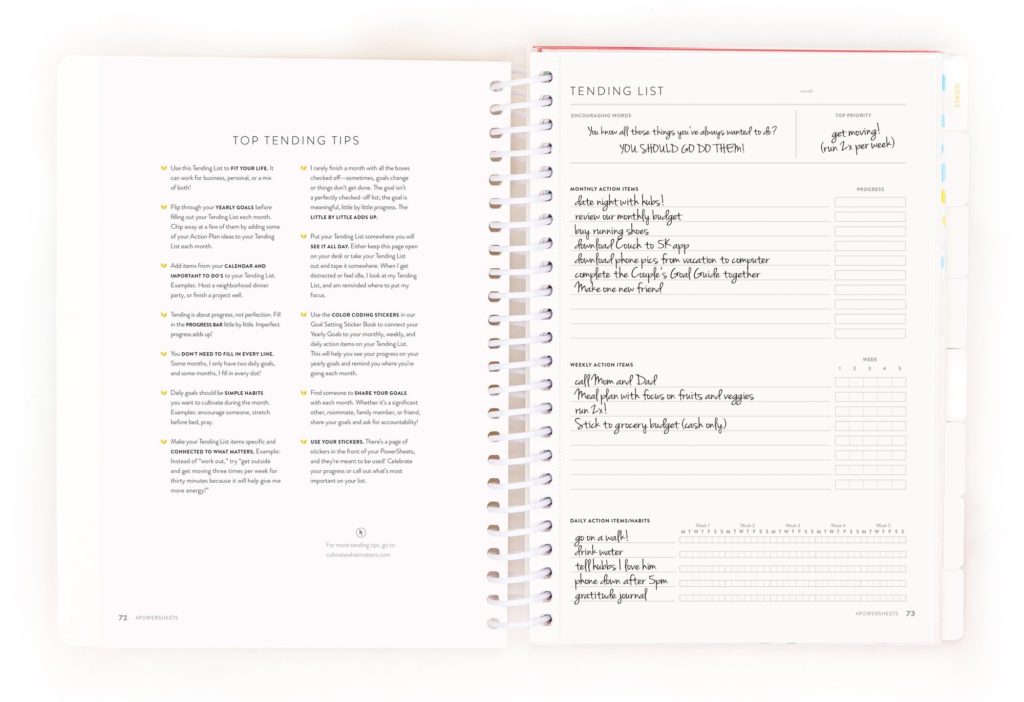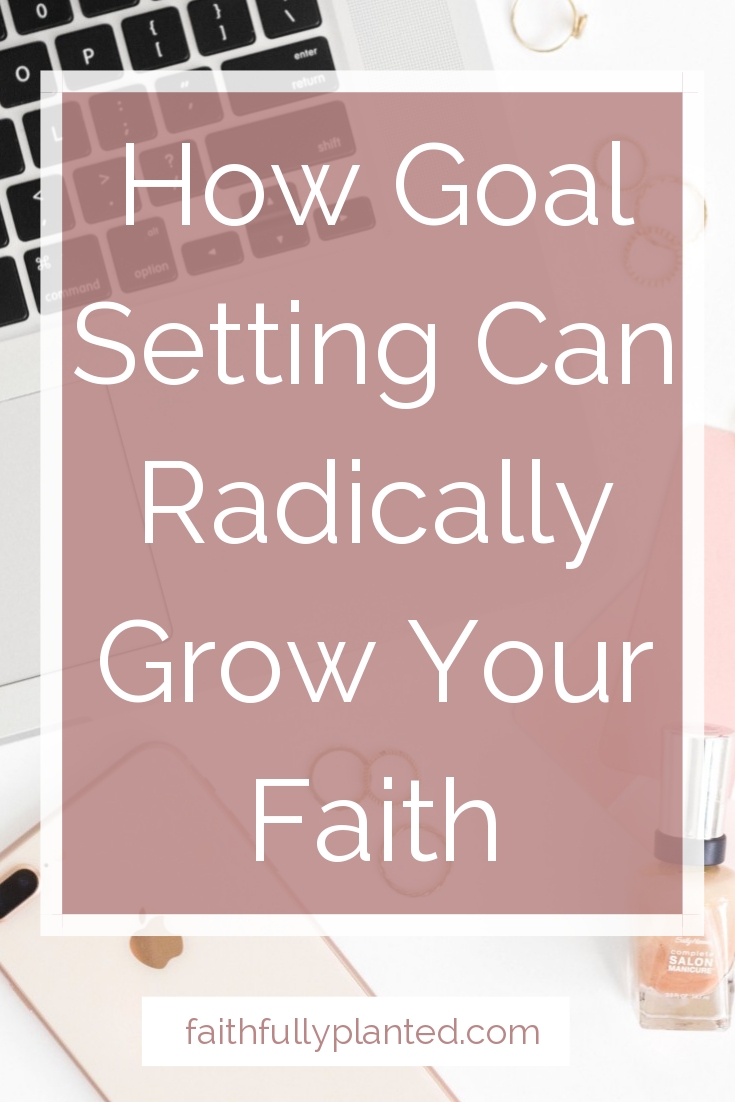
This post contains some affiliate links. If you make a purchase using my link, I may receive a small commission. I only recommend companies and products that I love and trust. This keeps the coffee brewing and the words flowing, so thank you for supporting Faithfully Planted!
Can goal setting really make that big of a difference in your faith?
The short answer is ABSOLUTELY YES.
But I won’t just leave it there-let me give you the long answer.
I started systematic goal-setting for the first in 2018. I had goals before, but I had no system for setting them or tracking them and oftentimes they just fell by the wayside when my responsibilities started to pull me away from my goals.
That’s when I found something called PowerSheets; it is a faith-focused goal planner and it has revolutionized the way I set goals and work to make progress in my relationship with Christ. If you’re like me, you need structure and accountability to stay motivated. That’s what this goal planner did for me and my faith has grown so much since I started setting goals for myself and specifically, for my faith.
Here is how it works:

Goal setting forces you to make a plan and actually track it.
When you are using the right tools, formal goal-setting forces you to write things down, set them in stone, and track them.
Just saying you have a goal to run a 5K isn’t enough; you have to make a plan to be successful. Not only that, your goals need to be meaningful for you and motivated by your innermost heart, not just by competition with someone else’s goals or life.
That is why I love my PowerSheets Goal Planner so much. It helped me uncover what I really care about and set goals that align with who I am and what God has called me to. This gorgeous, year-long planner sets you up to set intentional goals and to take the time to really understand what matters to you so you can spend your most precious resource the way you want to: your time.
Not only does this planner help you set big goals, but it also helps you to break them down into smaller goals and action items. And then gives you a space to track your progress on those goals on a monthly, weekly and daily basis.
This is one of the biggest reasons that I have been successful this year in making progress in growing in my faith and in my business. When you have somewhere that you’re tracking your progress and writing down your plan, that’s powerful.
Goal setting gives you direction and helps you focus your time.
I work full-time as an Academic Advisor and I use this analogy all the time when working with students who are dragging their heels on doing the work to explore careers and make a plan. If you don’t know where you are headed, it’s really difficult to get directions and figure out how to get there.
Living your life without defining your goals and dreams is like driving in a car using your GPS but not having a destination. You’ll cover some ground, and you may see some really cool things but eventually, you’ll run out of gas and end up lost.
Goal-setting in your life is like putting an address in that GPS; it gives you a destination so then you make a plan for how to get there.
It also means you know where to focus your time. If one of your goals is to get more sleep and feel more rested, then you’re not going to commit to late-night activities and do research on unrelated topics. If that is your goal, you’re going to read and learn and set a bedtime.
You’ll have a direction.
Goal setting helps you manage your priorities.
When you take time to really dig in and figure out what matters to you and what doesn’t, it makes it easier to prioritize and say no to those things that really aren’t a priority to you (or to God). When your goals are laid out and you’re actively tracking them, you know how to prioritize your time.
If one of your goals is to establish a deeply connected marriage, then you’re going to prioritize date nights and investing in resources to make that happen, such as counseling, retreats, baby sitters, books and conferences.
Instead of being pulled in every direction by the world around you, you will be able to say “No, that’s not a priority right now” and keep moving. When I know my goal is to make time for my marriage and someone invites me to do something so fun or I’m just dead tired, I’m going to take a rain check on invites and naps and go invest in my marriage because that is the priority.
It works the same with setting goals for your faith. If you set a goal to get up in the morning and read your Bible, you know that is the priority so you plan ahead and set 50 alarms and you get your booty out of bed. And since you know that it is important to you to get up early to do this, you’ll make better choices in the evenings to get this done.

Goal setting helps you visibly see your progress.
Specifically in the PowerSheets Goal Planner is something called a “Tending List.” This is where you take your big, overarching goals and break them down into monthly, weekly, or daily action items. Then, every week you mark your progress on each of your action items.
I love the way this goal planner is set up because it helps you set up big, year-long goals but then look at the little-by-little steps that will move you toward achieving them.
For example, one of my goals in 2019 was to create more margin in my life and time for rest and self-care. So, on my monthly tending list, I find a life-giving activity and set a mini-goal to do it. This month, it was a girl’s trip to St. Louis with one of my best friends. On my weekly list, I set a mini-goal to take a bath and read once a week. Each of those things gets me closer to having more margin and more rest in my life overall.
Cool, right??
Visibly seeing your progress can be so motivating and so encouraging as you look back at each month. When you feel like maybe you barely moved the needle, you can look and see that you accomplished more than you thought.
Or, maybe you’ve neglected your goals and you can see that so you get back on the horse.
There is so much grace to be found in goal-setting and in choosing to press ahead despite what you might view as a failure.
So, why the PowerSheets Goal Planner?
The tool that I use (& absolutely love) is the PowerSheets Goal Planner by a Christian-based company called Cultivate What Matters. If you’re looking for a tool that will help you not only set and track goals but to guide you through setting goals that really matter to you, this tool is invaluable.
There were goals I already knew I wanted to set at the beginning of this year, but the prep work at the beginning of the goal planner helped me dig up some goals that I hadn’t thought about before. This planner also helped me to eliminate some goals that weren’t aligned with my true heart and what God was calling me to.

This planner has radically grown my faith because it’s given me a place to solidify my goals and make them clear as well as track them and see my actual progress. I have seen my discipline in my faith growing because all areas of my life are being intentionally cultivated through the lens of my ultimate goals.
If you’re curious, my goals for 2019 were to:
Cultivate a thriving, Christ-centered marriage.
Create healthy habits for my body and mind.
Grow my blog and shop to be meaningful and profitable.
Grow deeper in my faith.
Cultivate intentional and meaningful free time and recreational activities.
Steward my time and money well through life-giving planning and routine.
Cultivate meaningful family and friend relationships.
Each of these goals has action steps that I identified underneath it and are year-long goals; some are lifelong, but the little by little progress is what I get to work on every day.
Ready to make 2023 your best, most intentional year yet? Now is the time!
Your Sister In Christ,




